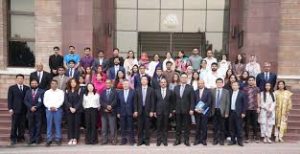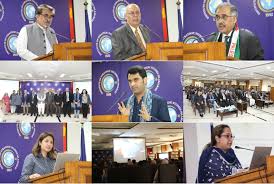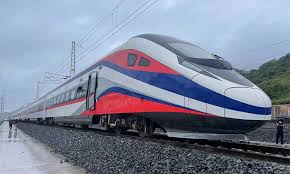Karandaaz Launches data portal on Pakistan’s financial indicators

Islamabad: Karandaaz Pakistan has launched a state-of-the-art online data portal with aggregated data on financial services and selected socioeconomic indicators for the country.
The data on the portal covers segments such as demographics, national economic data, agriculture finance, financial access, and behaviors of individuals, banking infrastructure and transactions, micro, agri, and SME financing, housing finance, non-bank financial institutions (NBFIs), mobile money, and telecommunications statistics.
The portal is interactive, intuitive, visually appealing and easy to navigate. It also offers the capability to generate bespoke data dashboards and has filtering and layering functionality. A webinar to highlight the various features of the data portal and the significance of credible and easy-to-access financial data for decision-makers was recently held by Karandaaz. Drawing on publicly available information from reputable sources, the breadth of information contained in the portal will expand over time with the addition of new data categories and metrics accompanied by continuous backend upgrades. The portal can be accessed at https://karandaaz.com.pk/karandaazportal/.
Talking about the significance of credible data for policymakers, the Chairperson of Karandaaz Pakistan Dr. Shamshad Akhtar said, “Good-quality and open and easy access to statistics and data is critical for Pakistan’s sound policy making and project design. As we come out of the shadows of the pandemic, digital connectivity to, among others, deepen financial inclusion have emerged to be sustainable solution to reduce poverty and rejuvenate the economy. Pre-COVID gaps in financial inclusion have been glaring. KRN has been working with the Government, regulator and all stakeholders to realize the vision of the National Financial Inclusion Strategy and meet the targets of enhancing financial inclusion across gender and geography. KRN has supported the development of core infrastructure of the digital financial inclusion including technology and payment solutions.
These endeavors are reinforced by KRN initiatives to institutionalize vehicles to finance micro and small businesses and institute supportive credit enhancement. Within this context, timely and reliable statistics and data portal will play a critical role in the design of futuristic policies and monitoring of ground progress. Devising strategies that can lead the country towards sustained financial progress. Policymakers, development partners, corporates, researchers and academia, and entrepreneurs, all have a need for statistics on the financial sector for identifying trends, learning from successes, ascertaining gaps, and mapping a necessary course of action in order to make interventions that can reap the best dividends for the economy. Informed decisions backed by metrics, facts, and figures are the best decisions and that is precisely why we at Karandaaz felt that a sophisticated data portal where information is available for sound decision making is critical.”
Sima Kamil, Deputy Governor State Bank of Pakistan said, ““As a regulator of the financial sector of any country, the central bank’s reliance on credible data for making policies that are likely to trigger growth and progress are fundamental. Although there is a lot of data available out there, there is a definite need for a consolidated source that is perceived as unbiased, credible, and pro-growth. We hope that this data portal that has been developed by Karandaaz will serve as a credible resource for government agencies, the financial sector, industry associations, and development agencies to gather invaluable insights and evidence on the most important indicators for planning and policymaking. I look forward to engaging with Karandaaz on further enriching the portal as a go-to resource on financial inclusion.”
Annabel Gerry, Head of Development of UK’s Foreign, Commonwealth, and Development Office (FCDO) in Pakistan said, “Good, reliable and easy-to-understand data is essential for measuring impact and formulation of evidence based policies. I congratulate Karandaaz on setting up such a comprehensive and visually appealing SME data portal which will fill an important information gap in Pakistan. I am hopeful a wider set of actors in the market, including financial institutions, businesses, regulators and senior policy makers, would find it useful for better understanding SMEs in Pakistan.”
Ali Sarfraz, CEO Karandaaz said, “The importance of data to make informed decision making identify effective public and private actions, set goals and targets, monitor progress, and evaluate impacts cannot be stressed enough. We have endeavored that Karandaaz data portal offers a host of macro, financial and sectoral statistics in a user-friendly interface that can also be customized by the users. We have painstakingly collected the most credible information in order to ensure that users have confidence in the quality and integrity of the data and the information we present is of practical utility. Therefore, in addition to developing a one-stop aggregator tool, in the future, Karandaaz aims to continue adding more information in the portal and add features that allow users to generate more nuanced learnings and insights.”
Karandaaz data portal has used the most up-to-date technology for data storage and visual representation and enables modular access to information for users to easily sort through different indicator categories and the flexibility to download data option in formats such as excel and .csv. The portal also offers the feature of search through keywords and is browser agnostic to ensure that all users can easily reach the information they are looking for, benefit from it, and download it for future use in the format of their choice using visualization tools such as line, bar, and pie charts. The portal also offer the option of layering different indicators across each other for a meaningful analysis.
During the webinar a panel discussion to highlight the various features of Karandaaz data portal and the significance of data-driven decision making especially in the context of financial policy planning in a developing economy such as Pakistan was also held. The panel discussion was moderated by Ms. Mehr Shah, Director Knowledge Management and Communications at Karandaaz and the participants of the panel discussion included Ms. Raeda Latif, Head of Marketing and Business Development at Pakistan Stock Exchange; Mr. Blaine Stephens, Advisor on Inclusive Finance; and Dr. Syed Zahoor Hassan, Professor and Former VC of LUMS.





